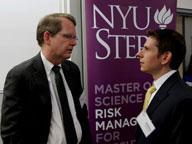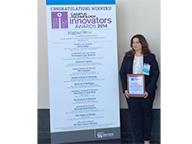School News
—
Prof. Susan Stehlik's undergraduate class experiment on gender and leadership is highlighted
—

Excerpt from Entrepreneur -- "In an experiment conducted at the Stern School of Business at New York University in 2003, male and female graduate students who assessed the leadership capabilities of a real-life successful entrepreneur named Heidi were far more inclined to admire this accomplished individual when she was recast as Howard. Judging the likeability factor. Students given the case study about Heidi perceived her as 'selfish,' 'out for herself,' and 'a little political' -- in short, not as likable as Howard. When this experiment was replayed in 2013, substituting Kathryn and Martin for Heidi and Howard, students actually liked Kathryn slightly better than Martin (8 versus 7.6) -- but they didn’t trust her nearly as much (6.4 for Kathryn, 7.8 for Martin). As the evaluators explained to CNN correspondent Anderson Cooper, who staged the replay, 'men seem more genuine,' whereas women seem to be 'trying too hard,' making them less trustworthy."
School News
—

Excerpt from Entrepreneur -- "In an experiment conducted at the Stern School of Business at New York University in 2003, male and female graduate students who assessed the leadership capabilities of a real-life successful entrepreneur named Heidi were far more inclined to admire this accomplished individual when she was recast as Howard. Judging the likeability factor. Students given the case study about Heidi perceived her as 'selfish,' 'out for herself,' and 'a little political' -- in short, not as likable as Howard. When this experiment was replayed in 2013, substituting Kathryn and Martin for Heidi and Howard, students actually liked Kathryn slightly better than Martin (8 versus 7.6) -- but they didn’t trust her nearly as much (6.4 for Kathryn, 7.8 for Martin). As the evaluators explained to CNN correspondent Anderson Cooper, who staged the replay, 'men seem more genuine,' whereas women seem to be 'trying too hard,' making them less trustworthy."




















